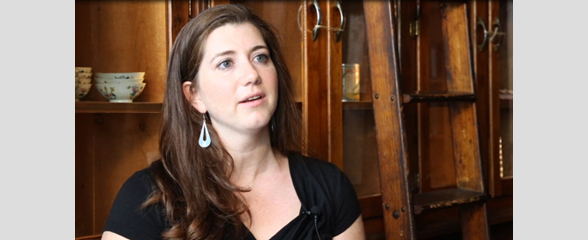 | In this oral history interview, Genia Blaser shares her experience working as a staff attorney at the Immigrant Defense Project and how her work informs contemporary immigration laws and policies. She talks about how she is connected to the Golden Venture story and what must be done to bring about meaningful change to help at-risk immigrant communities in the United States today. | 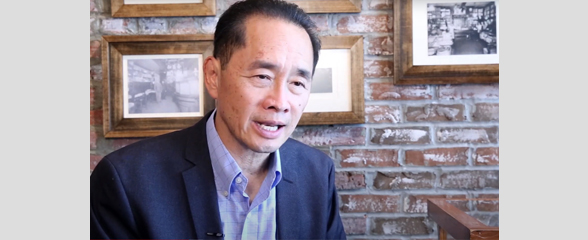 | In this oral history, MOCA interviews Ti-Hua Chang, a Chinese American television news reporter who was the first journalist to cover the story of the Golden Venture when it ran aground off Rockaway Beach, Queens, on June 6, 1993. He discusses how he was first informed about the Golden Venture and the process of reporting on the event. Chang recounts how his news station had brought in an anti-immigration lawyer to speak on the story, and how he felt compelled to speak up to counter the lawyer’s hate rhetoric, launching into a speech about Chinese Exclusion and anti-Asian racism in the United States. His coverage continued during the detainments. He reveals that the ten individuals who drowned during the Golden Venture voyage were kept in the New York City morgue for months because no one wanted to bury them, and they were eventually sent to a pauper’s grave, where they were buried in stacks of five, which according to Chinese superstition, meant that their souls would never be at peace. When Thomas Sung, of the Abacus Federal Savings Bank, heard about this, he donated money to have the drowned individuals buried in separate plots. Chang speaks about the racist attitudes towards Chinese people in the United States and the issue of organized crime in the Chinese community. He believes that the Golden Venture passengers were unfairly detained to be made examples by the United States government to discourage Chinese undocumented immigration. He believes that the United States owes reparations to Chinese people, who built the Transcontinental Railroad and were integral to the development of this nation, and yet were met with Chinese Exclusion. Finally, he stresses the importance of having diverse newsrooms and journalists who would have the cultural competency to cover diverse stories. | 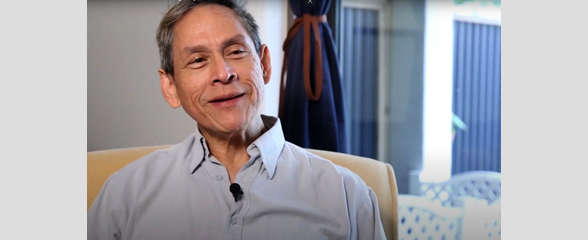 | Fernando Chang-Muy has had a long career in immigrant and refugee legal advocacy, including as staff attorney and Director of the Southeast Asian Refugee Project at Community Legal Services in Philadelphia, and as Legal Officer for the UN High Commissioner for Refugees (UNHCR). He currently teaches Refugee Law and Policy at the University of Pennsylvania School of Law, and Social Work and Immigration in its Graduate School of Social Policy and Practice. At the time of the Golden Venture, he was involved in training attorneys in York County to represent Chinese immigrants who had been transferred to the local immigrant detention center. In his brief historical overview of the then existing legal infrastructure, Chang-Muy explains that asylum law was relatively new and legal practitioners were few, thus highlighting the importance of the Pennsylvania Immigration Resource Center’s (PIRC) development of legal training. His historical overview also covers the 1986 Immigration Reform and Control Act, the 1996 Illegal Immigration Reform and Immigrant Responsibility Act, a history of America as country of immigration and refuge for Quakers, Chinese, Central Americans, Syrians and other groups, the raising and lowering of refugee resettlement quotas under various presidents, and attempts to stop the entry of Muslim refugees in the era after 9/11. He gives in-depth legal expertise on the applicability of due process to the Golden Venture Chinese, reasons for prolonged detention, and issues of concern in the immigration detention and asylum process and system. Chang-Muy then pivots to discuss desired visitor takeaways from the MOCA FOLD Exhibition. The oral history ends with a brief discussion of his personal and family history, including the immigration of his father from Cuba as a refugee, and its influence on his decision to pursue a career in immigration law. | 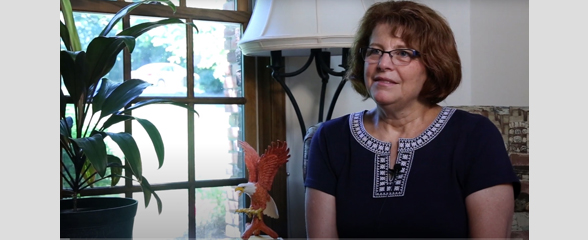 | This oral history focuses on People of the Golden Vision’s treasurer and founding member Cindy Lobach, as she reflects on the role of the paper sculptures in the Golden Venture detainees’ eventual release. She discusses how the sculptures have ended up in many unexpected places, which speaks to their lasting cultural impact. Lobach reflects on how the detainment of the Golden Venture refugees and their beautiful artwork changed their supporters and the people of York. She also discusses how the creation of these paper sculptures gave the detainees hope for a better future. Lobach describes these refugees’ difficulties adapting to York and the racist attitudes many people have towards immigrants. She hopes that visitors to the exhibit will be come to understand that many immigrants who come to the United States undocumented do so because they are fleeing persecution and there is no other choice for them. She hopes the exhibit will show the potential of art to change lives. | 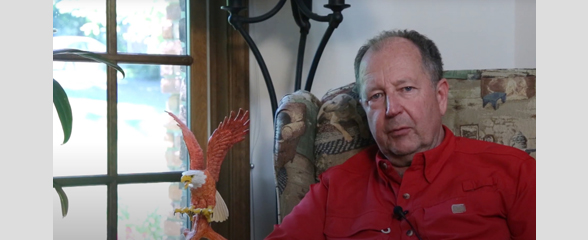 | This oral history focuses on Jeff Lobach, who was President of the Pennsylvania Bar Association at the time of the Golden Venture. He organized the lawyers who were trained for the purpose of defending the detainees of the Golden Venture. He speaks about his experience as a lawyer at the time, and how he faced frustrating rulings and resistance from the Justice Department. He worked to spread awareness about the Golden Venture at the time and discusses the significance of art and the sculptures in the movement. He also talks about how his personal life has been enriched by each of the asylum seekers whom he has defended as a lawyer. | 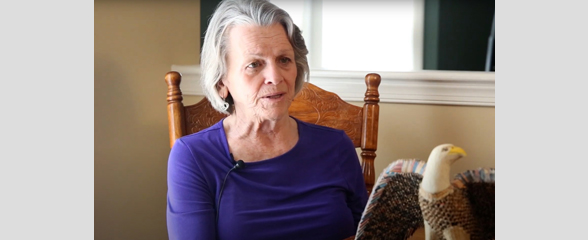 | This oral history focuses on Joan Maruskin, one of the original founders and coordinators of People of the Golden Vision, a group in York, Pennsylvania that advocated for the rights of the Golden Venture refugees. Maruskin is also a staff member of the Church World Service Immigration and Refugee Program. She discusses how she first heard of the Golden Venture detainees, the founding of the People of the Golden Vision and their work, how People of the Golden Vision expanded, and what she believes are the outcomes of her advocacy work. She stresses the important role that the media played in spreading word about the Golden Venture immigrants’ plight and how successful the immigrants went on to become in their respective communities. She also discusses the situation of the Golden Venture women who were detained in New Orleans, Louisiana, and were eventually resettled in Ecuador. She emphasizes the integral role that the Golden Venture immigrants play as productive members of society and contributors to the rich cultural fabric of the United States. She recalls the impact that the organization had on legislative reform. She stresses the importance of reforming family detention, which is tearing families of immigrants apart. Maruskin says that while People of the Golden Vision had a large impact, they were just ordinary citizens who cared about what was happening. She hopes that visitors to the exhibit can see themselves in the stories of the Golden Venture refugees, and that it will inspire the visitors to become advocates for immigrant rights in their own way. | 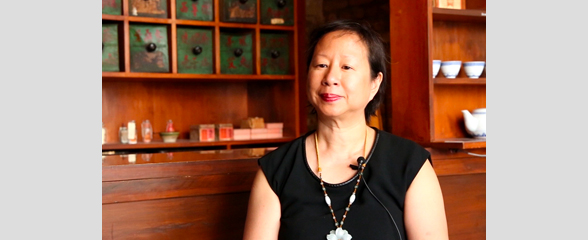 | Elizabeth OuYang is a Chinese American attorney who has advocated for immigrant and Asian American civil rights for more than three decades. At the time of the Golden Venture, OuYang was a staff attorney at the Asian American Legal Defense and Education Fund (AALDEF) tasked with advancing voting rights and prosecuting hate crimes, and in this capacity, she assisted with interviewing Golden Venture Chinese who were detained at the Varick Street detention center. In addition to this work, topics of her oral history also include the legal landscape of immigration in the 1990s and post 9/11; her work representing Arab Muslims and South Asians; the impact of the broken immigration system and Trump administration on undocumented immigrants; the rise in hate crimes against Chinese and Asian Americans following the grounding of the Golden Venture; and desired visitor takeaways from MOCA’s FOLD exhibition. | 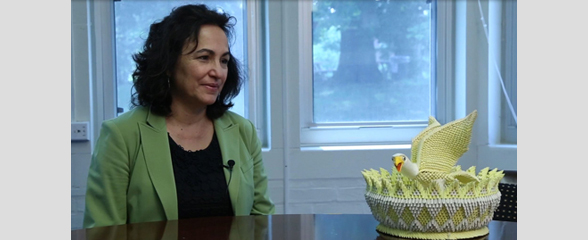 | This oral history focuses on Mary Studzinski, the Executive Director of the Pennsylvania Immigration Resource Center (PIRC) in York County, Pennsylvania. Mary discusses the history and role of PIRC in serving immigrants in detention, which began in response to the Golden Venture. The organization’s operations include educating immigrants about their legal options and guiding them through the asylum application process. She also discusses how circumstances have changed for immigrants under the Trump administration, and the repercussions of the 2017 executive orders on community safety, economies, children, and families across the country. | 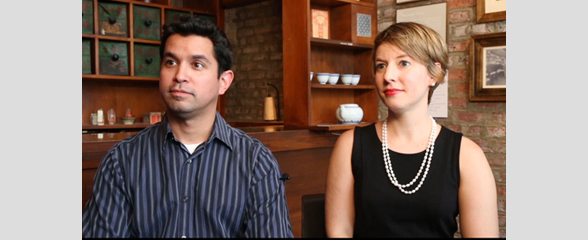 | This interview, led by a law professor and staff attorney, goes over immigration policies and detention facilities of the United States and how those policies have become shaped by the Golden Venture cargo ship. Golden Venture smuggled undocumented immigrants from China into the United States (Rockaway, Queens) in 1993. Claire and Ernie discuss the 1986 and 1996 immigration acts and how they changed within a decade. These policies, which were once welcoming to undocumented immigrants and immigrants looking for asylum, turned hostile post 9/11. The Homeland Security Act, which was introduced in 2002, largely impacted immigrants and ethnic communities that resided in the United States. Claire and Ernie describe the living conditions and locations of detention facilities throughout the United States. They also discuss the unjust process of deportation of undocumented immigrants during their check-ins with U.S. Immigration and Customs Enforcement (ICE). These strict policies end up breaking up families and leaving unaccompanied children, even infants, in juvenile detention centers. | 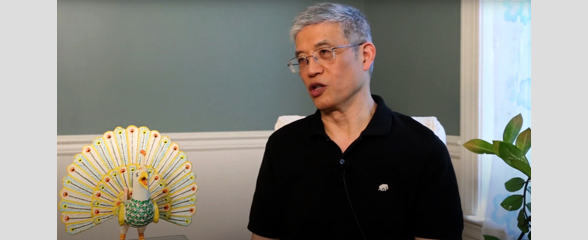 | This oral history focuses on the Chinese American academic Zehao Zhou, as he reflects on how he came to be a translator for the People of the Golden Vision, the challenges of this advocacy work, and how his relationship with the Golden Venture detainees in York County Prison developed. He reminds us of the full humanity of the detainees and gives insight to life in the prison and how the paper folding projects came about. He reflects on the idea of paying forward good deeds and the importance of recognizing the full humanity of everyone, rather than seeing them through the lens of stereotypes. He hopes that visitors to MOCA FOLD exhibit will be able to see the full humanity and diversity of the Golden Venture refugees, their supporters, the People of the Golden Vision, and even the politicians who supported their cause. He hopes that the exhibit will inspire visitors to pay it forward in their own way. He also reflects on the impact that the activism of the Golden Vision has had on his daughter, her generation, and the residents of York, which is still a very conservative place. Daughter of Zehao Zhou, growing up amidst the advocacy of the Golden Vision, has come to the conclusion that being an American is a privilege, but the nation state is also full of discrimination and injustice. These two narratives are not contradictory. |









